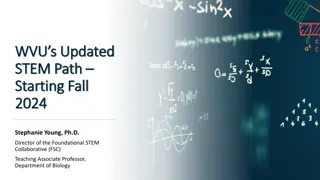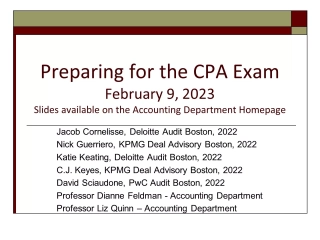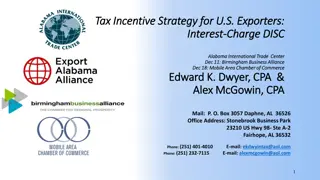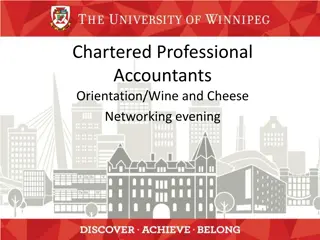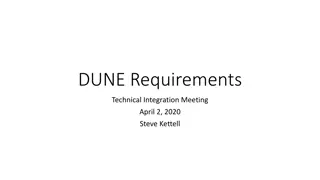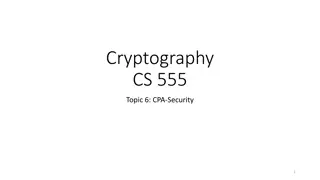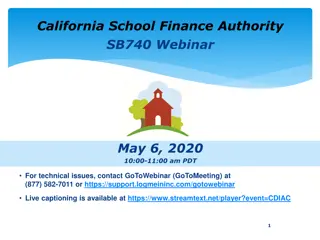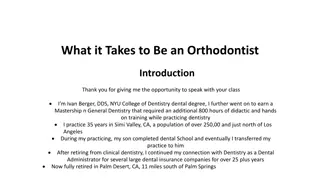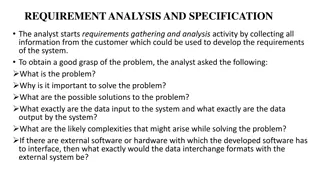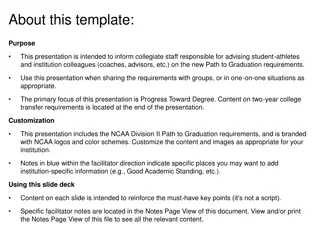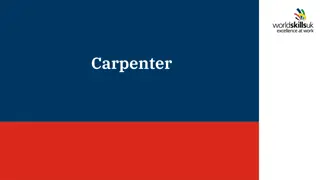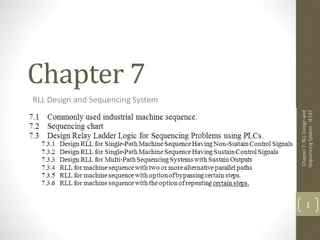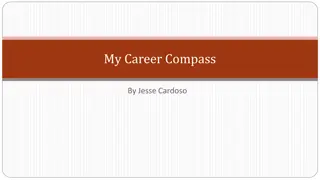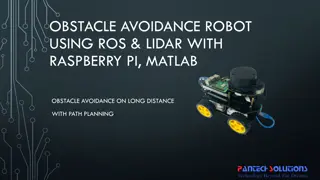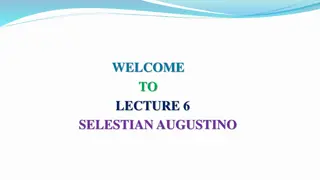Path to Becoming a CPA: Requirements and Process Overview
Discover the steps to becoming a Certified Public Accountant (CPA), including education requirements, the Uniform CPA Examination, gaining experience, obtaining licensure, and maintaining your license through continuing education. State-by-state variations are highlighted to guide aspiring CPAs through the process effectively.
Download Presentation

Please find below an Image/Link to download the presentation.
The content on the website is provided AS IS for your information and personal use only. It may not be sold, licensed, or shared on other websites without obtaining consent from the author. Download presentation by click this link. If you encounter any issues during the download, it is possible that the publisher has removed the file from their server.
E N D
Presentation Transcript
What Does It Take to Become a CPA?? Presented by ThisWayToCPA: AICPA s new website for college students and CPA exam candidates
What Is a CPA? Stands for Certified Public Accountant Trusted financial advisor who helps individuals, businesses, and other organizations plan and reach their financial goals All CPAs are accountants, but not all accountants are CPAs
To Become a CPA 3 E s are required for licensure: Education Exam or Uniform CPA Examination Experience State Boards of Accountancy determine the laws and rules for each state/jurisdiction Visit ThisWayToCPA for state requirements
Education Requirements vary by state/jurisdiction (see state requirements) Most states now require 150 semester hours Number of accounting hours (in the 150 total) is dependent on state requirements
Uniform CPA Examination Computer-based format Consists of 4 sections Auditing and Attestation (AUD) Business Environment and Concepts (BEC) Financial Accounting and Reporting (FAR) Regulation (REG Same test no matter where it is taken Passing score is 75 on a 0-99 scale Question types include multiple choice, simulation and written communication Eligibility to sit for exam depends on state (see state requirements) Click here for more exam information
Experience A candidate is an applicant for a CPA license Many states require the candidate to have 1 2 years experience under a CPA Additional requirements vary by the candidate s: Education e.g., Graduate degree vs. 150 hours of undergraduate Employer(s) e.g., Public accounting firm vs. industry Type of work e.g., Tax professional vs. auditor
Licensure Licenses gives the right to practice public accounting Some states require Ethics exam (see state requirements) Must comply with rules of professional conduct Licensure timeline
Maintaining the License Continuing Professional Education (CPE) Typically 40 hours per year Types (e.g., computer-based vs. group/classroom learning) of CPE vary by jurisdiction May need Ethics training and compliance Subjects vary depending to type of license and area of employment Renewal every period
AICPA Membership Become an AICPA Student Affiliate Member! AICPA membership provides: National membership organization for the profession Support for the diverse membership and efforts to build the future of the profession Advocacy with standard setters and state boards Professional excellence in terms of professional ethics, training, peer review Discounts and affinity programs (even for students!)
State Society Membership State CPA Society vs. State Board of Accountancy Society is a membership organization Board sets policy How do State Societies and AICPA differ? National vs. state/jurisdiction Work closely together in many cases
Lets Review Most requirements are determined by the state/jurisdiction in which you hope to practice. In general, this is a summary of the steps to CPA licensure. Bachelor s degree Bachelor s degree 150 semester hours Education all 4 parts state requirements Apply to sit based on state requirements Pass all 4 parts with a 75% or higher Exam 1-2 years in accounting Under a CPA Experience
Review Continued Again, this is a summary of the steps to maintaining a CPA license. Requirements do vary by state/jurisdiction. Meet state/jurisdiction 3 E s requirements Other requirements (e.g., ethics exam) License 40 hours of CPE per year Renew license every 1, 2 or 3 years Continuing Professional Education Join state society, AICPA and volunteer Specialize in one or more areas (e.g., CFF) Beyond
Tips Understand your state/jurisdiction s requirements Take it one step at a time! Focus on the education requirement first Become eligible to sit for the Uniform CPA Examination Study for (and pass!) the CPA Exam Gain the required experience
What Is ThisWayToCPA? AICPA s new website for college students and CPA exam candidates A virtual warehouse chock full of the information (and motivation) you need to pursue a career in accounting Includes features like Find Your Fit, CPA Profiles, and an online community
Resources ThisWayToCPA (AICPA website for college students) at http://thiswaytocpa.com AICPA web site for CPA candidates at http://www.aicpa.org/Membership/Join/ Start Here, Go Places. (AICPA website for high school students) at http://www.startheregoplaces.com/ NASBA web site at http://www.nasba.org/





